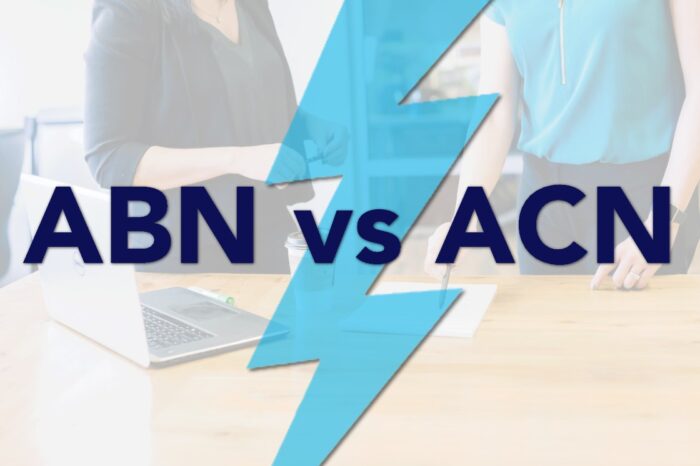23 Mar What is the difference between an ABN and ACN?
 Author: Ian Aldridge, Progressive Legal
Author: Ian Aldridge, Progressive Legal

In Australia, businesses are identified by two different numbers – an Australian Company Number (ACN) and an Australian Business Number (ABN). While they may appear similar, there are important distinctions between the two. This article explores the difference between an ABN and ACN, and when each one is required in which circumstances.
What is an ACN?
ACN stands for Australian Company Number. It is also a 9-digit number used to identify businesses in Australia, but it is specifically for companies registered with the Australian Securities and Investments Commission (ASIC).
An ACN is issued to a company when it is incorporated and is used to identify the company in various legal and administrative processes. All companies in Australia are required to have an ACN.
At the end of the day, for a company, the ACN is what is the identification of the company, as the company can change its name but it can’t change its ACN. That is the ultimate identifier of it.
What is an ABN?
ABN stands for Australian Business Number. It is a unique 11-digit number used to identify businesses operating in Australia. ABNs are issued by the Australian Taxation Office (ATO) and are used for tax and business purposes.
All businesses in Australia are required to have an ABN if they are carrying on an enterprise. An enterprise is defined as any activity done in the form of a business or trade, including activities done by a charity or other non-profit organisation.
Key difference between ACN and ABN
The key difference between ABN and ACN is that an ABN is required for any business that is carrying on an enterprise, whereas an ACN is only required for companies registered with ASIC.
Another difference is that an ABN is primarily used for tax and business purposes, while an ACN is used for legal and administrative purposes.
Finding an ACN or ABN
To search for an ACN, you can use the ASIC Connect search tool.
If the company is registered with ASIC, the search results will include the company’s ACN.
To search for an ABN (Australian Business Number), you can use the Australian Business Register (ABR) search tool.
If the business is registered with the ABR, the search results will include the business’s ABN.
You can also search for an ACN or ABN using the ABN Lookup tool, which is provided by the Australian Business Register (ABR).
If the business is registered with the ABR, the search results will include the business’s ABN and ACN, as well as other details such as its registered address and business status.
Key takeaways
In summary, businesses in Australia are required to have either an ACN or an ABN, depending on their legal structure and whether they are carrying on an enterprise. While the two identification numbers share some similarities, they serve different purposes and have distinct requirements.
- ACN is used to identify companies registered with ASIC, while ABN is used to identify any business that is carrying on an enterprise.
- All companies in Australia must have an ACN, while any business carrying on an enterprise must have an ABN.
- An ABN is primarily used for tax and business purposes, while an ACN is used for legal and administrative purposes.
- Some businesses may need both an ACN and an ABN, such as a company that is carrying on an enterprise or a sole trader who incorporates their business.
- It is crucial for businesses to understand the differences between ACN and ABN and ensure they have the appropriate identification numbers for their operations.
If you have any further questions or concerns about the differences between an ACN and an ABN, please don’t hesitate to reach out to us. Our team of expert lawyers is always here to help you navigate the complexities of running a business in Australia.
ABN vs ACN FAQs
What is an ARBN?
In Australia, ARBN stands for Australian Registered Body Number. An ARBN is a unique nine-digit number that is assigned to a company by the Australian Securities and Investments Commission (ASIC) when the company is registered as a foreign company in Australia.
Foreign companies that want to do business in Australia are required to register with ASIC and obtain an ARBN. The ARBN is used to identify the company in various transactions and filings with ASIC and other government agencies.
It is important to note that an ARBN is different from an Australian Business Number (ABN), which is a unique identifier for all businesses operating in Australia, including both Australian-owned and foreign-owned companies.
How to register an ABN?
You can register for an ABN online through the Australian Business Register.
Once you’ve submitted your application, the ABR will review it and, if approved, will issue you with an ABN. It’s important to note that not all businesses are eligible for an ABN, and certain conditions and requirements may apply depending on your business type and circumstances. You can find more information on the ABR website, or you may consider consulting a professional advisor for assistance.
How to update or cancel an ABN?
You can update or cancel your ABN through the Australian Business Register (ABR).
It’s important to note that cancelling your ABN will not automatically cancel your business registration or tax obligations. You may need to contact other government agencies and professional advisors to ensure you’ve fulfilled all your legal and financial requirements.
Tailor Made Legal Documents
We can provide you with tailored Legal Documents in a number of areas including: Intellectual Property Law, Commercial Law, Privacy Law, Workplace Law, Corporate Law, and Litigation / Dispute Resolution.
Click here to request a fixed-price Legal Document and have a look at the range of different documents we can help you with.

Ian Aldridge is the Founder and Principal Lawyer Director at Progressive Legal. He has over 15 years experience in advising businesses in Australia and the UK. After practising in commercial litigation for 12 years in major Australian and International Law Firms, he decided to set up a NewLaw law firm in Australia and assist growing Australian businesses. Since then, he has advised over 2,500 small businesses over the past 6 years alone in relation to Intellectual Property Law, Commercial, Dispute Resolution, Workplace and Privacy Law. He has strived to build a law firm that takes a different approach to providing legal services. A truly client-focused law firm, Ian has built Progressive Legal that strives to deliver on predictable costs, excellent communication and care for his clients. As a legal pioneer, Ian has truly changed the way legal services are being provided in Australia, by building Legal Shield™, a legal subscription to obtain tailored legal documents and advice in a front-loaded retainer package, a world-first. He has a double degree in Law (Hons) and Economics (with a marketing major). He was admitted to the Supreme Court of NSW in 2005.






